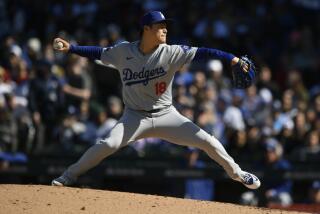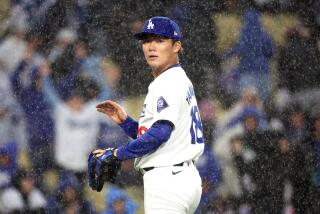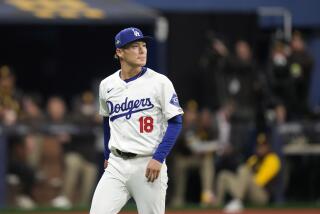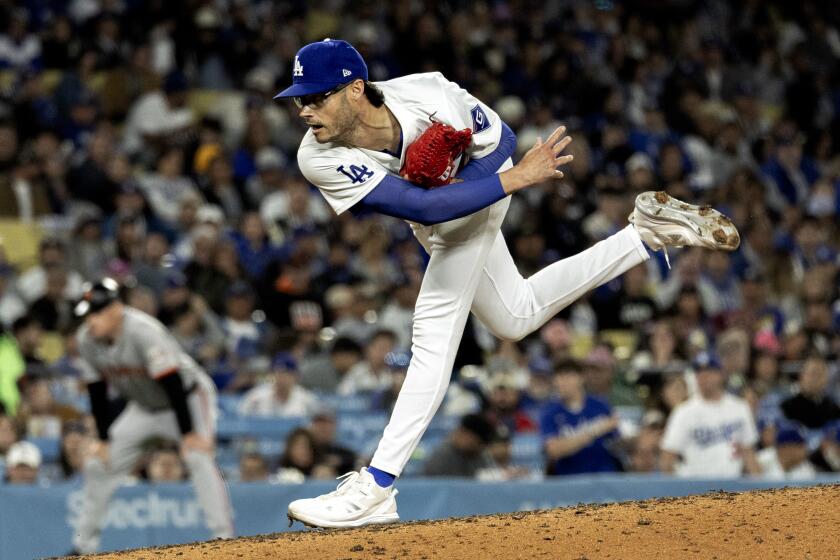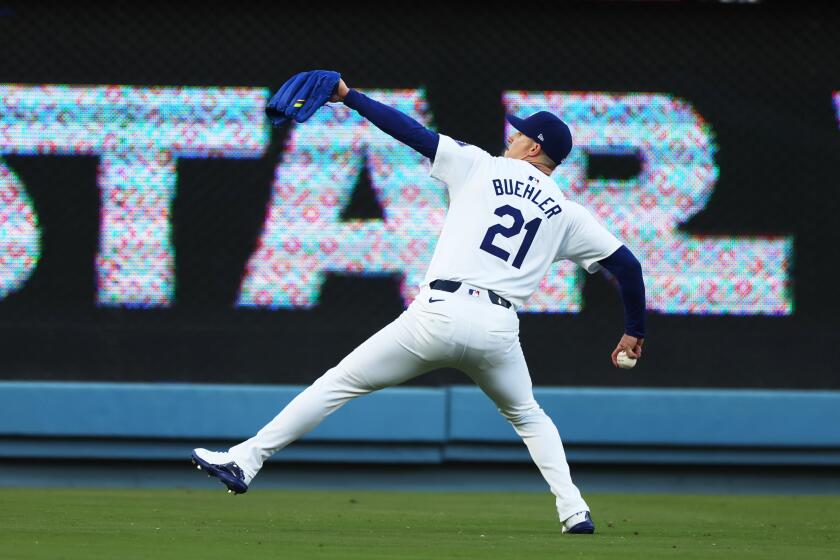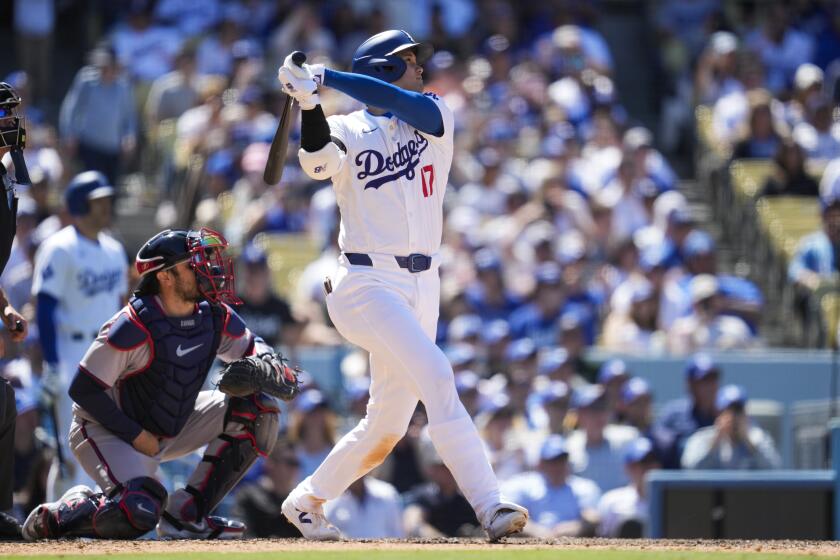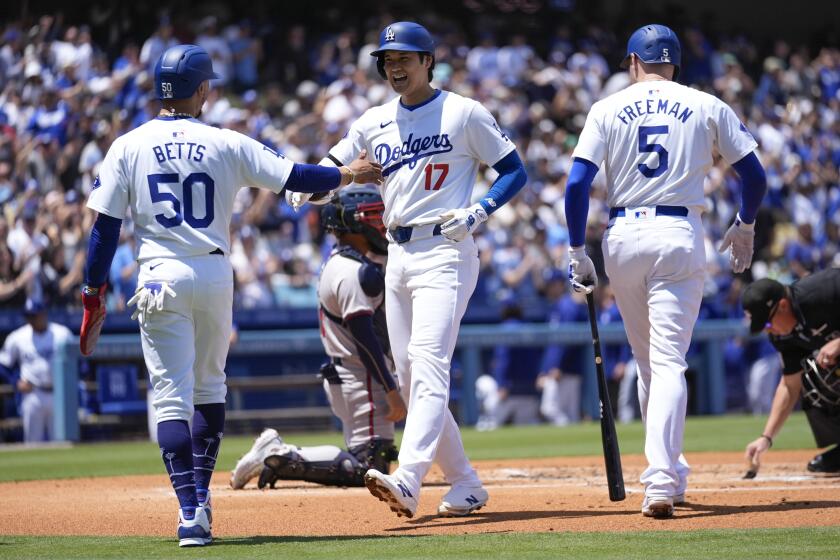How Dodgers’ Hyun-Jin Ryu rose from South Korea to MLB All-Star starter
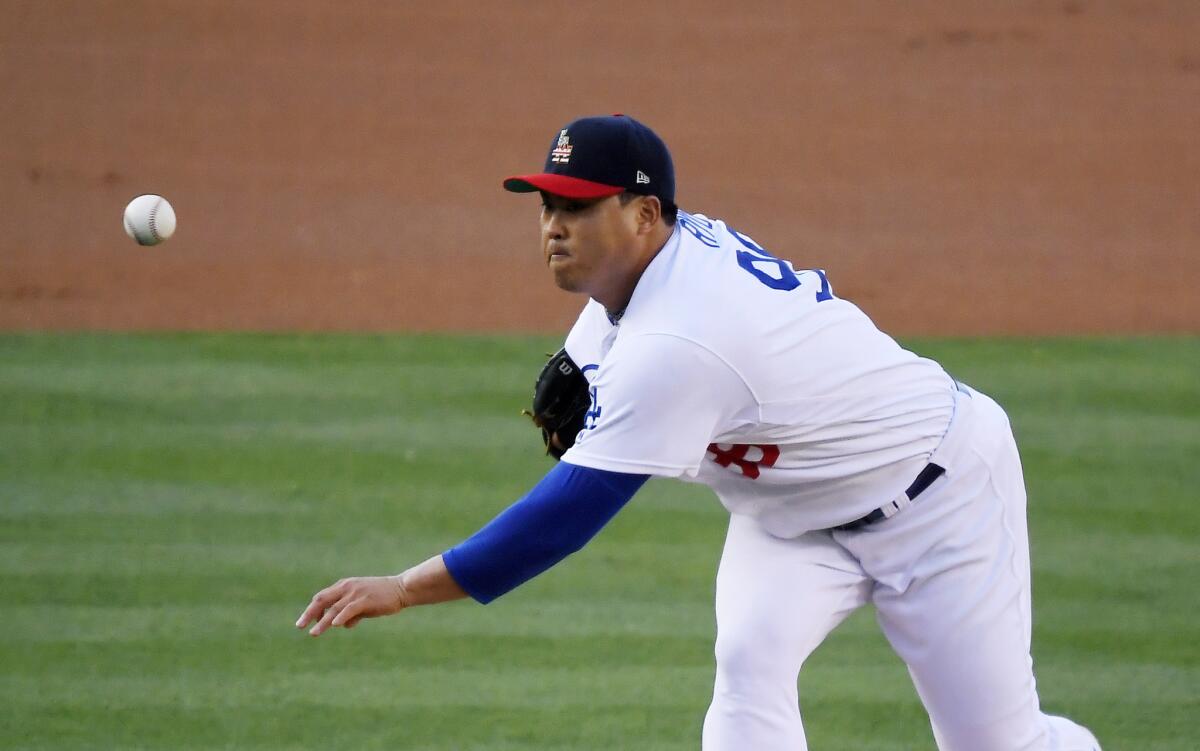
The three men waited in the parking lot until the very last minute before getting out of the car to slip into Daejeon Hanbat Baseball Stadium for first pitch.
It was September 2012. For years, the Dodgers, like many other major league teams, had kept close tabs on a 25-year-old South Korean left-hander named Hyun-Jin Ryu, monitoring his rise from intriguing amateur to established ace with the Hanwha Eagles in the Korean Baseball Organization.
Ryu was expected to become available to MLB clubs that winter and the Dodgers wanted one last look to ensure, above all, he was healthy before entering the sweepstakes. So scouting director Logan White, director of Asian operations Acey Kohrogi and scout Byung-Hwan An arrived for a final in-person incognito inspection, emphasis on incognito.
An had suggested the Dodgers sign pitcher Chan Ho Park, the first Korean-born player to appear in the major leagues, two decades earlier. He served as the Korean national team manager and was a longtime manager in the country’s industrial league. He was famous. Then there was White.
“It’s kind of hard to hide me in Korea because I’m about 6-2, 235,” White said. “I’m a big white guy in Korea.”
One misstep and the baseball world would’ve known Dodgers officials were in attendance, potentially driving up the price for Ryu. They sneaked into the VIP area behind home plate on the field level. It was enclosed underneath the section for scouts. Most importantly, it was hidden from cameras. They made sure not to sit together. They did everything to not be seen together. It was old-school scouting paranoia.
“It was kind of awkward,” Kohrogi recalled.
Ryu pitched well and the Dodgers’ contingent exited undetected, convinced he was worth a hefty investment. They envisioned Ryu as a No. 3 starter on a championship-caliber club, a fine piece to insert in their rotation behind Clayton Kershaw for years to come. They returned to Los Angeles to lobby for Ryu, who was poised to become the first player to jump directly from the KBO to the majors.
“He wasn’t overpowering, but he could command the ... out of it,” White said. “He was a little heavy, but I don’t need body beautiful on the mound.”
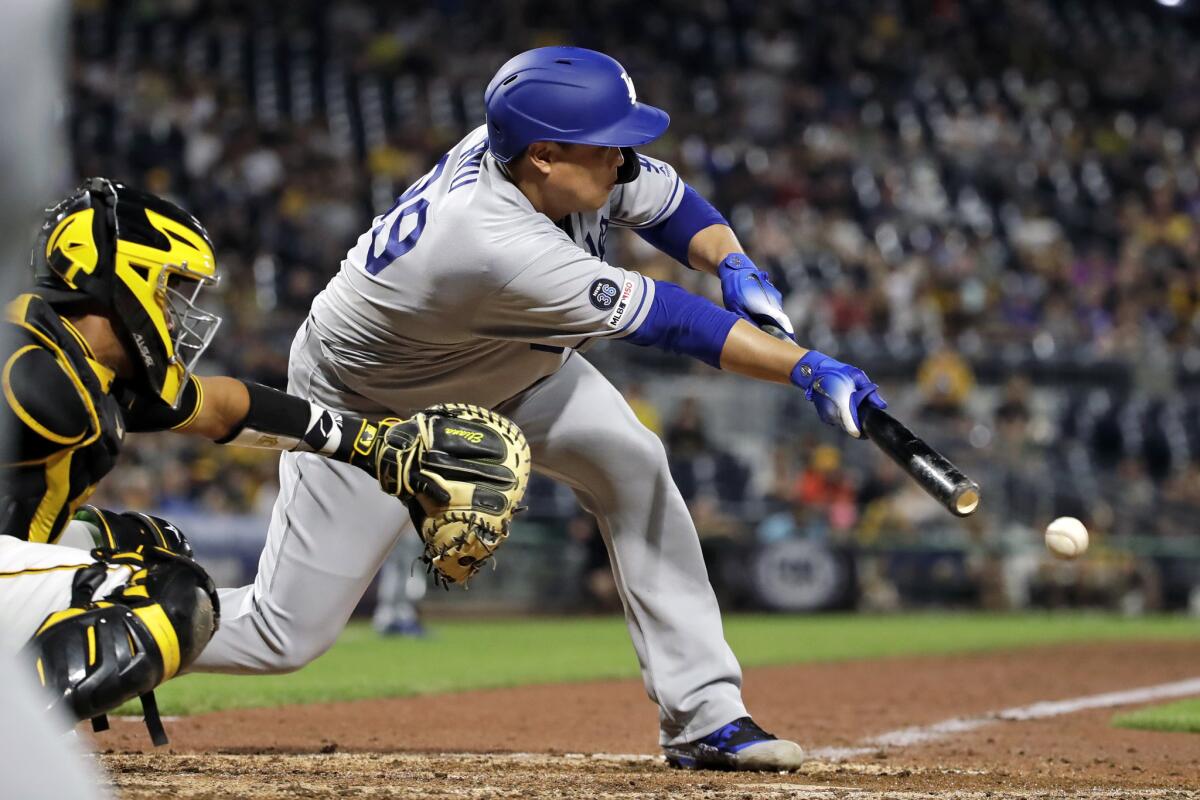
Three months later, Ryu signed a six-year, $36-million contract to become a Dodger. Seven seasons later, Ryu, after overcoming an assortment of injuries and betting on himself last offseason by accepting the Dodgers’ one-year, $17.9-million qualifying offer, is a 32-year-old veteran exceeding all expectations. On Tuesday, he will start the All-Star game in Cleveland for the National League, capping a dominant first half for the best team in baseball that has even caught himself by surprise.
“Of course I always thought I could compete in this league,” Ryu said through an interpreter, “but I didn’t know I was going to perform this well.”
::
Ryu did not alleviate any doubts during his first few days as a Dodger. In Korea, spring training workouts are longer and regimented. He found the freedom major league clubs afforded players unusual. Everything, he said, was different “from A to Z.” Dozens of Korean journalists descended on Camelback Ranch to record his every move. They watched him lag behind his peers in conditioning drills. He told the club he never threw between starts and didn’t want to modify his process. The Dodgers had two options: Force him to change or roll with it.
“We accepted the way he approached it,” said Ned Colletti, then the Dodgers’ general manager. “We had confidence in his stuff and competitiveness. We just had to get him acclimated and as comfortable as possible.”
The Dodgers had ample experience incorporating players from Asia — Park arrived from South Korea while Hideo Nomo and Hiroki Kuroda had been among the acquisitions from Japan since the mid-1990s — and Ryu adjusted to his surroundings. Luis Cruz, a Mexican infielder, helped him break the ice with teammates. He found passable Korean food in the Phoenix area and embraced the large Korean community in Los Angeles once the regular season started.
On the mound, he was one of the National League’s best pitchers and finished fourth in rookie of the year voting. He compiled a 3.00 earned-run average in 192 innings and made two postseason starts as Los Angeles began its streak of six consecutive National League West division titles. He was solid in 2014, posting a 3.38 ERA in 152 innings, but shoulder trouble surfaced. A year later, he underwent surgery to repair a torn labrum in his left shoulder.
Sign up for our Dodgers newsletter »
Injuries plagued Ryu at times in Korea — in high school, for example, he underwent Tommy John surgery — but the torn labrum was a career-threatening setback. The injury limited Ryu to one start over the next two seasons. A successful return would require patience and demanding behind-the-scenes labor.
“The entire process was basically the lowest point of my life,” Ryu said.
Ryu didn’t become a fixture in the Dodgers’ rotation again until 2017. He wasn’t the same when he returned — he recorded a 3.77 ERA in 126 2/3 innings — and was left off the postseason roster. Last year, he made a leap. Another major injury sidelined Ryu for the middle three months — he tore his groin May 2 — but he was often dominant when healthy. He concluded the regular season with a 1.97 ERA in 15 starts and was named the Dodgers’ starter for Game 1 of the National League Division Series.
The ascent, Ryu explained, was the result of three ingredients: a healthy arm, a new pitch and enhanced preparation. He added a cutter to his repertoire with pitching coach Rick Honeycutt’s guidance, which he said came easy to him because he already threw a slider. The pitch immediately opened new avenues to retire hitters. Between outings, he began spending more time studying the upcoming opponent, evolving from a passive to an active learner at Honeycutt’s behest. He pored over video and grew more vocal in pregame scouting meetings.
The extra work produced improved pitch sequences. He attacked the hitters with more vigor, putting on display the unmatched command the Dodgers noticed in South Korea. The success last season prompted Ryu to accept the qualifying offer to remain with the Dodgers instead of testing free agency, hoping a full standout season would increase his value on the market.
The gamble could net a jackpot next winter. Ryu has taken last season’s success to new heights to produce the best extended stretch of his professional career — in South Korea or the United States. He enters the All-Star break leading the majors with a 1.73 ERA and 9.9 strikeout-to-walk rate in 109 innings across 17 starts. His 0.91 WHIP is second. His 2.89 FIP is fourth.
“I think when he can locate it the way he can, no hitter can sit up there and guess what he’s going to give,” Honeycutt said. “And not only is he prepared well, he has an idea with what he wants to do with that guy.”
He was named the National League pitcher of the month for May, which included logging a shutout and carrying a no-hitter into the eighth inning in back-to-back starts. The dominance prompted Dodgers manager Dave Roberts — the National League All-Star team manager — to prematurely announce, to MLB’s dismay, what everyone expected: Ryu would start the All-Star game.
“For me, it’s very easy,” Roberts said. “Hyun-Jin’s been the best pitcher in the National League for the entire season so having him be the National League starter is a no-brainer.”
::
Growing up in Incheon, South Korea’s third-most populated city, Ryu began playing baseball at age 10, settling in as a left-handed pitcher even though he is right-handed for everything else. Like most young players in the country, he admired Chan Ho Park, who made his major league debut with the Dodgers in 1994 and represented the club at the 2001 All-Star game. Park’s accomplishments implanted the dream of playing in the major leagues.
Park signed with the Dodgers as an amateur and advanced through the farm system before debuting for Los Angeles. Ryu had that option. Major league clubs, led by the Dodgers and the Minnesota Twins, expressed interest in acquiring him out of high school.
“We tried to sign him,” said Rick Ragazzo, who recalled first seeing Ryu pitch as an amateur when he headed the San Francisco Giants’ international operations before joining the Dodgers as director of pro scouting. “It was easy. He was a big, strong kid who threw hard. He had a feel for throwing strikes. He knew how to read swings at an early age, which is something that is really hard. You don’t really see that a lot. He pitched above his years.”
Ryu chose to play in the KBO, but his goal of pitching in the major leagues remained while he established himself as a star for the Hanwha Eagles. He became the first player in KBO history to win rookie of the year and MVP in the same season as he led the Eagles to a championship, and was a seven-time All-Star.
Internationally, he excelled at the 2008 Olympics and the 2009 World Baseball Classic, which included two appearances at Dodger Stadium, where South Korea finished in second place to Japan. White and Ragazzo recalled noting Ryu’s aggressiveness against foreign players — in the KBO and international competition — and emerged encouraged by the mind set.
“He wasn’t backing down to anybody,” Kohrogi said.
The Eagles advanced to the playoffs again in 2007 but didn’t reach the postseason again with Ryu. They finished with the worst record in the league three out of Ryu’s final five seasons.
“Many people said he was an unfortunate ace,” said Korean journalist Jae Ho Kim of MK Sports, who has followed Ryu since he signed with the Dodgers. “He pitched very well but didn’t get the win because his team was so terrible.”
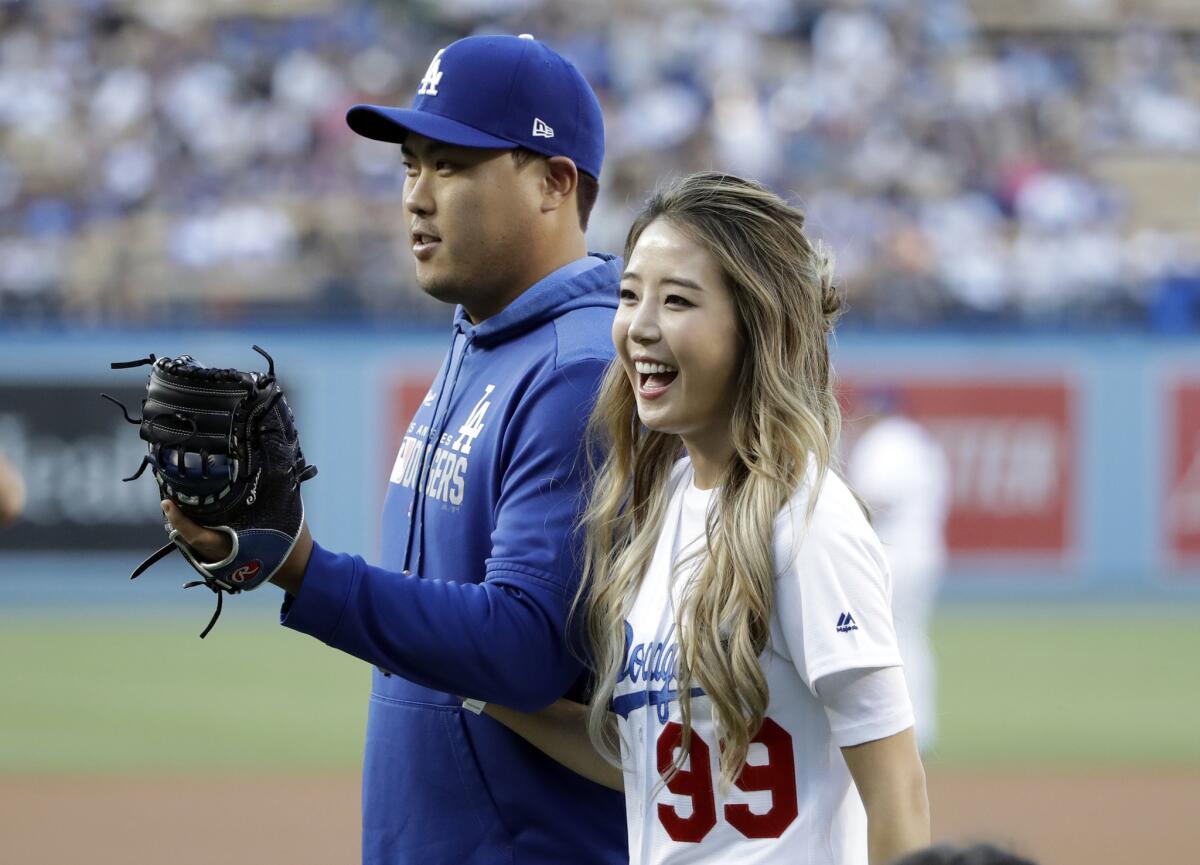
Hanwha finished last again in 2012, Ryu’s final campaign. A 39-year-old Park joined Ryu in the club’s rotation that season, the final of his professional career. Park was ineffective — he compiled a 5.06 ERA in 23 starts — but he was valuable to Ryu, who had decided he was leaving for the majors. Park spent the season offering him advice on the transition. On American culture. On the grueling schedule. On the increased travel.
The Dodgers, with their three-man contingent at the forefront, thoroughly tracked Ryu as he amassed a 2.66 ERA with 210 strikeouts. The Eagles posted him for major league teams in November 2012. The highest bidder would get an exclusive 30-day window to sign Ryu. Colletti decided to offer Hanwha $25,737,737.37 to negotiate with Ryu because 3 and 7 are considered good luck in Korean culture. The bid was accepted Nov. 9, giving the two sides until 2 p.m. on Dec. 9, a Sunday, to agree to terms.
The parties were initially far apart in negotiations. Ryu’s agent, Scott Boras, warned Ryu would play in Japan and re-enter the posting system the next year if the Dodgers didn’t offer him what they considered fair compensation.
“Because I was the first KBO player to come to the states through the posting system,” Ryu said, “I didn’t want to sign at a lower value than I thought I was worth.”
Colletti said intense negotiations began early on the morning of Dec. 9 — a day after the Dodgers signed free-agent pitcher Zack Greinke to a six-year, $147-million contract. The deadline spurred action. A deal was in place with less than a minute to spare. Six years, $36 million plus incentives. In two days, the Dodgers secured their No. 2 and 3 starters behind Kershaw. It was a pricey package propelled by their new ownership’s willingness to spend.
The Dodgers’ front office has since been overhauled — White and Kohrogi now work in the San Diego Padres’ front office, Colletti is an analyst on the Dodgers’ television network, and Ragazzo is a scout for the Atlanta Braves — but the initial expenditure is paying more dividends than ever this season.
Nearly seven years after that visit shrouded in secrecy, Ryu is a major league All-Star for the first time. He will have 15 relatives and friends — and possibly more — in attendance at Progressive Field in Cleveland. Millions back home will watch on television. It will be a historic moment for Korean baseball, one even Ryu and the Dodgers couldn’t imagine.
“I think,” White said, “it was worth it.”
Twitter: @jorgecastillo
More to Read
Are you a true-blue fan?
Get our Dodgers Dugout newsletter for insights, news and much more.
You may occasionally receive promotional content from the Los Angeles Times.

